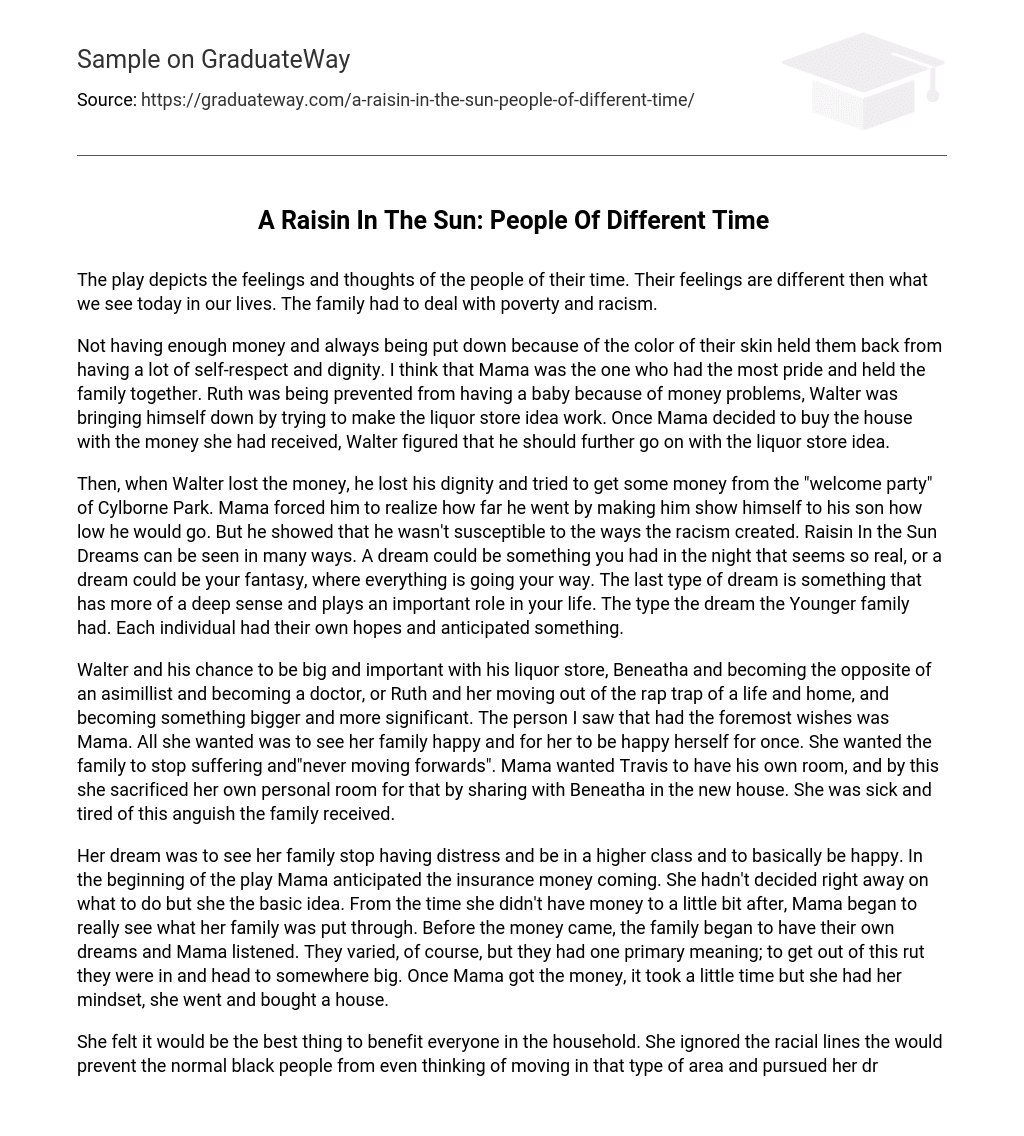The play portrays the emotions and thoughts of the individuals from their era, which differ greatly from what we experience nowadays. The family faced the challenges of both poverty and racism.
The lack of sufficient funds and constant discrimination based on their skin color hindered their ability to maintain self-respect and dignity. It is my belief that Mama was the primary source of pride and the one who kept the family united. Ruth faced obstacles in starting a family due to financial difficulties, while Walter’s determination to make the liquor store concept successful led to his own downfall. When Mama finally decided to use her received money to purchase a house, Walter saw this as an opportunity to pursue the liquor store idea even further.
When Walter lost the money, he also lost his dignity and attempted to obtain funds from the “welcome party” at Cylborne Park. Mama forced him to confront the extent of his actions by making him reveal his desperation to his son. However, he demonstrated that he was not susceptible to the ways in which racism had affected him. A Raisin In the Sun portrays dreams in various forms. A dream could be a vivid experience during sleep or an idealized fantasy where everything goes perfectly. Yet, the Younger family’s dreams held a deeper significance and held great importance in their lives. Each family member had their own aspirations and hoped for something better.
Walter, Beneatha, and Ruth all had aspirations for a better life: Walter dreamed of success with his liquor store, Beneatha aspired to become a doctor and reject assimilation, and Ruth longed to escape the cycle of poverty and achieve greater significance. However, it was Mama who had the most selfless desires. Her only wish was to see her family happy and experience happiness herself. Mama yearned for an end to their suffering and stagnation. She sought to provide Travis with his own room, even if it meant sacrificing her own personal space by sharing with Beneatha in their new house. The constant distress the family endured had taken its toll on Mama, leaving her exhausted and fed up.
Mama had a paramount objective: to enhance her family’s well-being and elevate their social status, ultimately resulting in happiness. Initially, Mama eagerly anticipated the insurance money without a definite plan but with a general notion. Gradually, Mama witnessed her family enduring financial struggles and comprehended their predicament even more after acquiring some funds. Before receiving the money, each family member possessed individual aspirations yet shared a collective goal – to conquer present difficulties and pursue superior prospects. It took Mama considerable time to reach a decision; however, she eventually utilized the money for purchasing a new house.
Despite encountering racial obstacles, Mama persevered in her conviction that owning a house would benefit everyone in the household. Despite not being present when the “welcoming committee” arrived, she was well aware of the challenges that awaited her. Even after losing crucial funds, her determination to fulfill her dream remained unwavering. Walter’s lack of abilities did not significantly impede her pursuit.
She made sacrifices for her family, such as working and being economical. Ultimately, everything turned out well in the end of the narrative. I believe this is because she remained steadfast and gave her best effort to not abandon her dream. Abandoning it would have been akin to giving up on her life. Her dream was undeniably a positive dream for everyone; all she wanted was to bring happiness to everyone. While Walter felt disappointed at times due to Mama’s refusal to provide the money he desperately needed, he didn’t perceive things in the same way as Mama. Mama was the one who saw beyond the obstacles that could hinder the realization of her dream. And that’s what she did most effectively—she clung to her dreams and made them a reality.





